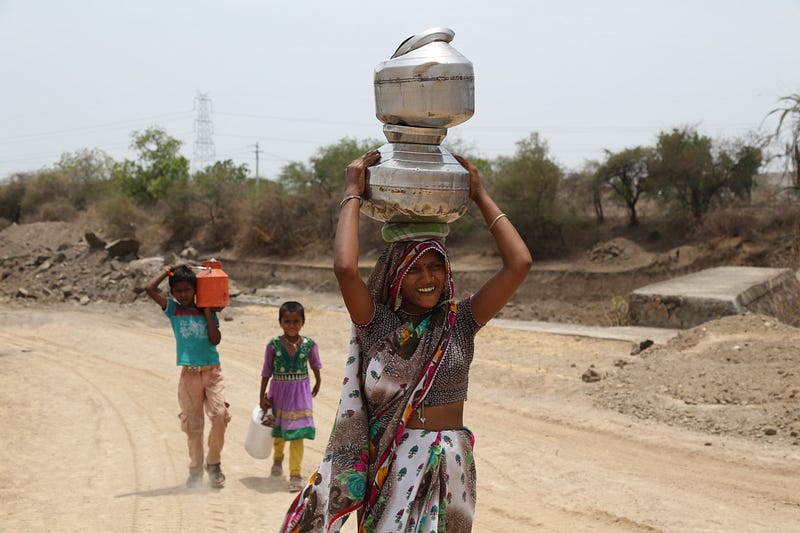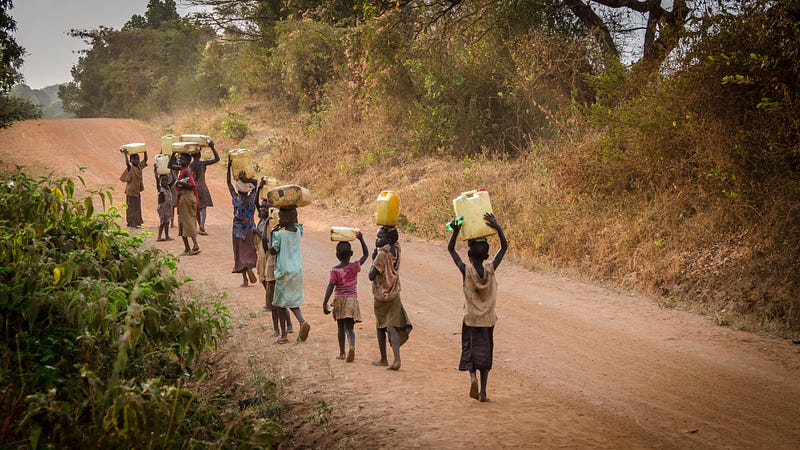Would you marry for a pail of water? Maybe once, and twice, and then again for a third time!
How far will you go to fetch water? A tale of two women from across the globe

Tale # 1 — Aysha from Ethiopia
It is 6 AM in the morning, and the sun is not out yet. But 13 year old Aysha has already woken up. She picks up three jerry cans, ties two on the side of his camel, and then embark on a journey to fetch water for her family. The journey takes her through a hot desert with sun shining bright on her head, yet she continues to walk. It is 9 AM and she still hasn’t reached her destination. It is 11 AM when she reaches a small water reservoir, and fills the three jerry cans. She washes the clothes she has brought along with and then continues her journey back.
At 3:35 P.M. she reaches back home, where her mother is elated to see the water cans. Aysha takes lunch with her family and then takes some rest. In the evening she talks to her brother about what he has studied in the school.
His brother explains that they are teaching about hygiene and sanitation, and that we should all wash our hands before eating. Apparently, Aysha and her mother do not agree with this logic.
At night Aysha goes to sleep, so that she can continue her journey the next day. As she sleeps, her mother is not bothered about her daughter’s education, but whether they would have water at home the next day.

Tale # 2 — Tuki, Sakhri and Bhaagi from India
Would you marry for a pail of water?
Apparently, this is what happened in a small village called Dengamal, only 120 miles from the bustling metropolitan city of Mumbai. Sakharam and his wife, lived in Dengamal village with their six children. The nearest drinking water source is a well in nearby village, and it often takes 12 hours for a round trip journey. To assist his first wife, Sakharam married two other women, who are known as ‘Water Wives’ and assist the family to bring more water. This form of ‘polygamy’ is not only prevalent but also socially accepted. Sakharam’s first wife is also in alignment with this arrangement as she can now spend more time with her children.
I. Did we know that there is an index called as “Average Water Fetching Time”?
Shown below is the average water fetching time for Ethiopian households, — there are still 10% rural Ethiopian households which spend more than 2 hours just to fetch their daily water.

WHO/UNICEF defines “basic access to water” if the round trip is under 30 minutes, and that includes the waiting period in line.

II. Why is it always the women/children who are tasked with this duty of fetching water?
Globally, women and girls spend 200 million hours a day to fetch water. All this time that could have been used to impart education and life skills to these women and girls. I wonder if someone ever asks these ladies the purpose of their lives. Halime Omer lost her child in the process of fetching water when she was attacked by a hyena.
When asked about the importance of water, Halime Omer said, “Who knows what water is than women?”

UNICEF and other welfare organizations across the world are trying hard to improve water accessibility, however the job is far from done.
— Half of the world’s population could be living in areas facing water scarcity by as early as 2025.
— 700 million people could be displaced by intense water scarcity by 2030.
Recap to remember:
— If your pizza delivery guy is 5 minutes late, please don’t shout and be considerate with him. There are people whose entire life is spent in just fetching water for their families.
— Just shut the tap off while brushing your teeth. That’s it. The world needs to get water smart. Everyone has a role to play, and we cannot afford to wait.
References:
— Water Wives: https://widerimage.reuters.com/story/water-wives
— https://edition.cnn.com/2015/07/16/asia/india-water-wives/index.html
— https://www.unicef.org/ethiopia/stories/who-knows-what-water-women
— Searching for Water in Ethiopia: A Day in the Life | UNICEFUSA
Please share your thoughts about the article, and what do you do to conserve water. 👏are optional, but they sure make us happy.
— Enjoy reading on Medium? Buy a membership for full access.
— Ko-Fi account (if you wish to tip)||Twitter


Comments
Comments are disabled for this post